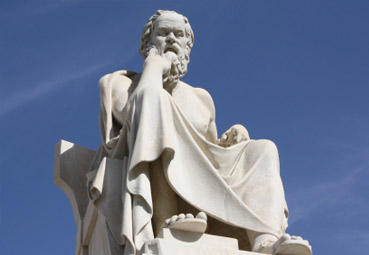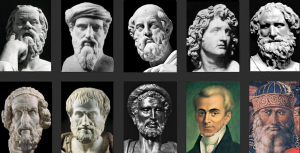
Philosopher (470 BC – 399 BC)
Greece is renowned for having given birth to heroes and sages. Socrates was both of them together. Socrates is considered as a landmark in philosophy. Modern history has divided philosophy into pre and post Socratic. Socratic philosophy, and in a broader sense philosophy, has the essence of practising virtue. Through the practice of virtue comes the cleansing of the soul, which is followed by its perfection.
Socrates’ philosophy, unlike most other philosophers at his time, was not based on the surroundings but was centred on man. His philosophy aimed at making man virtuous and to live a good and happy life. For this to be achieved, one should not act contrary to his beliefs. Socrates taught that knowledge came from within, not from the outside world. Through knowing oneself one would live a life with virtues. Socrates did not teach what things were right and wrong to do and did not aim to correct people’s mistakes. Instead, through logic he was able to persuade people to direct their behaviour towards what was best for their spiritual development. His method, which came to be known as the Socratic Method, was the following: He would hide the fact that he knew under a cloak of ignorance and pretend that he did not know. Then, he would discuss with his interlocutor and through questions he would eventually reach the opposite definition which the interlocutor had originally put, thus proving them that their argument was wrong. He rejected democracy because quantity did not determine quality. People were obliged to conform to the opinions of people who knew and not to the opinion of the many. Socrates considered absurd people who did not know, to do something that they did not know, nevertheless to have an opinion about it.
Socrates practised meditation. Plato saves a very important excerpt in his Symposium with Alcibiades narrating about what he witnessed during the battle of Poitidaia. Socrates meditated standing from one sunrise until the next without moving. His fellow soldiers watched with complete awe and respect as the philosopher made contact with the Divine Beings of Light right at the time when the sun’s rays reached the horizon during the sunrise. As his spirit left his body from Earth, Socrates made an aetheric flight around our world. What he saw is described in detail in Plato’s works Phaedon and Symposium. Socrates described Earth’s view from space in much the same way as our astronauts recently did. He described it as being spherical and divided into 12 pieces of skin, covered with different colours. They are the 12 meridians, from which different electromagnetic waves are emitted and give these colours. Moreover, he described how the Earth contains multiple colours, colours that are visible by airplane passengers above the clouds, the white colour of the poles, the blue colour of the seas etc. He was the first to mention the concept of gravity. Socrates also witnessed the Divine Aetheric Fields, a world that is outside of our visual field and is home to higher spiritual entities. This could be a possible explanation for the enigmatic daemon of Socrates. During the next dawn, he returned to Earth. With his journey, he created the bridge that linked humanity with the Divine Beings of Light. He was just 40 years old at the time.
Socrates stood as an example of the person he intended to make others. Unfortunately, the same people he was serving turned against him and ultimately resulted to his unjust trial. He was not afraid of death. He believed that is was impossible to be afraid of something that you do not experience or you do not know because it could be something good. According to him, death is nothing more than the separation of the immortal soul from the mortal body, and the passage of the soul to a higher plane. Those who are afraid of death do not know what death is. He taught his students even at the final moments before his death. Socrates faced death as a reality and defeated it. Soon after his death, the Athenians repented for his death and assigned Lysippus to construct a bronze statue of him, which was to be placed at the courtroom. Socrates’ accusers did not have a good end. Melitus was sentenced to death by the Athenians as killed by stoning. Anytus was exiled to Herakleia where he was also stoned to death. Lycon was exiled as well.
Today, Socrates is remembered as one of the founding fathers of philosophy worldwide. His life and work has been compared to that of Jesus Christ, having taught his philosophy around several parts of the city without founding a new school. In contrast to popular belief, Socrates wrote numerous books, which unfortunately have not survived while Jesus did not. Socrates had his students who, after his own death, founded many schools and allowed philosophy to flourish. Unlike Jesus, however, none of Socrates’ students ever betrayed him or abandoned him. Instead, they risked their lives to rescue him from his death sentence. Socrates’ students remained loyal to him until the end, proving their spiritual superiority over Jesus’ students, who did not stand by him during his death, nevertheless help him carry the cross during his crucifixion. Peter, for example swore never having met Jesus when he was asked by the Romans. Jesus promised his students Paradise and an eternal life should they follow him. Socrates never promised his students anything except for their own spiritual and ethical development. In the end, Jesus asked God on his cross why did he abandon him. Socrates never expressed sorrow and greeted death without bitterness. Through his actions, Socrates became a symbol to humanity. He holds the torch of immortality for those who wish to follow him to the Aetheric Fields and be united with the Divine Beings.
Bibliography
- Altani. Arritoi Logoi: Hellenikos Dia-logismos. Athens: Georgiades, 2012. Print.
- Kraut, Richard. ”Socrates”. Encyclopaedia Brittanica. Web. 1 Nov. 2016.
- Pleuris, Konstantinos. Greek Philosophers. Athens: Hilektron, 2012. Print.
- Pleuris, Konstantinos. Socrates Before Death. Athens: Hilektron, 2013. Print.

[…] Heraclitus – G… on Socrates […]
LikeLike
[…] Socrates, there was Heraclitus, the founder of philosophic thought, the glory (κλεῖτος) of Hera […]
LikeLike
[…] was a philosopher and the founder of the Cynic School of philosophy. Credited as one of Socrates’ most loyal students and Diogenes’ teacher, Antisthenes was concerned not with Plato’s […]
LikeLike
[…] the Pre-Socratics to the Neoplatonists including Hesiod, Homer, Pythagoras, Heraclitus, Empedocles, Socrates, Plato, Aeschylus, Pindar, Pletho were all initiates of Orphism. Homer, the immortal poet of all […]
LikeLike
[…] was one of Socrates’ most loyal students. After the outbreak of the Peloponnesian War Megara and Athens became […]
LikeLike
[…] who in turn initiated Plato. Furthermore, two students of Philolaus, Simmias and Ceves became Socrates’ students. It is believed that Philolaus and Plato met each other during their […]
LikeLike
[…] Phocion’s accuser Agonides to death and built a statue of him, the same they had done to Socrates almost 100 years […]
LikeLike
[…] was born in Athens during the Peloponnesian War. He was a student of Socrates. When the Athenians sentenced Socrates to death, Xenophon left Athens in disgust and settled in […]
LikeLike